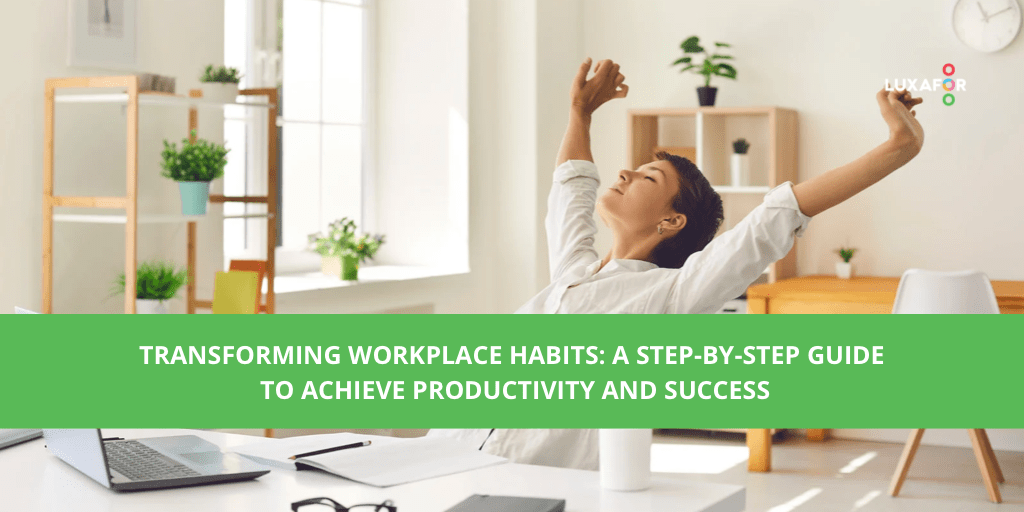Transforming Workplace Habits: A Step-by-Step Guide to Achieve Productivity and Success
Are you often late, procrastinate, cancel plans last minute and choose unhealthy snacks during lunch breaks instead of healthy meals, which start to reflect in your work progress, results and overall well-being? You are definitely not the only one and you are not alone – these are all habits that we don’t think about on a daily basis, but when we receive yet another reminder to do something about our habits, there has to be a an impulse – a commitment to change our old and unproductive work habits for better ones.
Changing your personal as well as workplace habits is based mostly on internal work with yourself, so that your motives and understanding of what you need to change, eliminate and what you want to achieve are essential. The process of changing habits often requires dialogue with the conflicting parts of your personality, and having an honest and serious conversation with yourself and deep inner work.
Do you want a tool to help you change your habits? Get your free PDF guide!
Recognize harmful and bad habits
In order to recognize that a habit has become harmful or “outdated”, therapists usually advise to observe yourself in everyday life, to analyze your rituals, habits and behavioral patterns. Then you can decide which of the daily habits that you practice automatically are not working in your favour and what habit no longer brings any satisfaction and progress. Getting to know yourself is always a long-term investment, so it’s well worth your time and energy. For start, you can make a list of your work habits and try to look at them, classifying them in different ways, for example, on a scale from very harmless to actually harmful habits.
It might seem that a few bad habits against the background of all the other good things you do during the day are a not significant, but the habits are the main key to your success and productivity, changing which will not only make life easier, but also open up wider opportunities in the professional field and make your life better in general.
Do you want a tool to help you change your habits? Get your free PDF guide!
Do you want a tool to help you change your habits? Get your free PDF guide!
Time to change your habits
Smoking, procrastinating, binge watching YouTube videos, being late, junk food, overworking, not sleeping enough – are just some of the bad habits in the sea of endless ways of harmful behaviour. Think about these types of habits and you will agree that you need to get rid of them quickly, as they do not represent a successful, productive and confident person. As commonly accepted in modern psychology – it takes less than two months to change very small habits.
You have to choose the habit that no longer serves you and replace it with a better alternative – a better habit. In the beginning, for the first few days you will act the same way, then alternately or only think the same way, until finally in reality you will start to act differently more and more often. The reflex will remain for some time, but the old habit will gradually disappear and the new one will be strengthened in your routine at the same time.
This is an approximate estimate how work on changing any habit happens, but the duration and complexity of this process depends on the depth of the habit itself, the individuality of each person and readiness for change.
New Year, new me – not really
If someone has the idea that tomorrow you will start a new life and change old habits, it is a sign that you actually want these changes to happen now, not in a near or distant future. Tomorrow then becomes today and once again change is only on tomorrow’s agenda. In such moments you have to ask yourself – why not now?
We are sure that each person can identify and already know the typical work habits and at what point some of them start to become harmful. If a person is not aware of them, then sooner or later someone will point it out, or some situation will force to change and to act differently.
However, although external stimuli such as the New Year often serve as a motive for fighting bad habits, the fact that the calendar has changed in the New Year means absolutely nothing to a person’s inner world. This is one of the main reasons why New Year’s resolutions are forgotten a month later. A person’s motives for changing something in their life are complex, sometimes contradictory and most often they are personally and subjectively grounded.
How are habits formed?
Habits are formed from repeated actions, thoughts and feelings that are reinforced over time until they become fixed in the subconscious and become our automatic actions.
Why is it so hard to change bad habits? Everyone has some bad habits at work or in personal life. These are automatic actions and do not require you to think about them. In most cases, old habits never completely disappear from the subconscious – they are simply replaced by other habits.
So how long does it take to form a habit? It is widely believed that it takes 21 days to form a new habit. However, different periods of time are mentioned in different studies, so it can be concluded that this period of time may be different for each person. Of course, it also matters – what kind of habit it is, how deeply rooted it has been over the years.
There are plenty of theories about how long it takes to build a new habit: 21 days, 30 days, 60 days, but there is nothing about the time passing itself that magically forms a habit. Habits are created based on your inner work, repetition and frequency, not by the passing time. The honest answer is that creating and maintaining a new habit takes forever, because once you’ve stopped doing it, it is no longer a habit
Why change habits?
During this transition phase 2 egos – yesterday’s old and tomorrow’s new can collide within us, as changing habits involves internal contradictions and strife. Listen to them! Who are the characters in these internal dialogues? A defiant child fighting against a parent’s strict demands? The avoidant child who ignores or the protesting teenager? These are quite typical internal reactions in situations where we have to force ourselves to change.
For example, a health problem may require you to give up an eating habit, but you end up snacking even more or completely ignore your doctor’s instructions. So, first of all, there’s something you need to do to keep yourself healthy. A completely different question is – how much do you want it? It is very important to identify your needs, but can be very distracting when you have to do something unpleasant, laborious, and perhaps not immediately gratifying.
Certainly, many who have decided to change something are familiar with the dispute between want and need, so it is possible to overcome it – by challenging yourself. Become a support for yourself who can successfully negotiate with the part of you that does not want to change or is afraid of change.
Luxafor Flag busy light
Eliminate distractions;
Achieve deep work by controlling your workflow;
- Get it for as little as $33
Strategies that can help change your workplace habits
Changing workplace habits is an important prerequisite for sustainable development and self-improvement, we have collected four essential elements or steps that will help you achieve this goal more easily:
- First, you have to analyze your bad habit and understand how it works. You can track or write down every time you repeat the bad action. This will help to understand in which moments there is a greater temptation to succumb to the temptation of a bad habit.
- Replace a bad habit with a good one. For example, if you spend too much time procrastinating, try to better manage your time doing more productive tasks that get you closer to your desired goals or block websites that steal your time.
- Be sure to celebrate the small professional wins and milestones as well. It is also important to note even the small progressyou make – all this will help to move forward more successfully.
- Be kind and patient with yourself – don’t get upset if everything doesn’t go as expected right away. When starting to introduce new habits, you should expect that from time to time you will most likely return to old habits. However, self-criticism makes you lose motivation and contributes to low mood and even depression.
Remember – You don’t have to be perfect! And this is another reason why it is better to focus on the process rather than the result. By changing your workplace habits step by step, you will be able to measure your progress and maintain your motivation in the long term. Focusing only on the goal can quickly demotivate you.
You can even use Don`t Break The Chain method to track, eliminate old habits and implement new and productive ones consistently without any breaks and interruptions – this practice could be beneficial as it takes time to introduce new and better action patterns. During the first 21 days or even months of introducing the new habit this tracking method will serve as a reminder to stay on your path to successfully reach your goal.
Concluding
It is very important to be aware that your life mostly is the result and reflection of your habits that define how successful or unsuccessful you are. Recognizing that there may be a part of us that doesn’t want to change some of the habits is important, because only then can we begin to get to know these parts of us and think about what to do with them.
For example, if a habit is old and associated with many pleasant associations, it may be challenging to get rid of it. Sometimes even the slightest first action or attempt of giving up a bad habit can help people. Don’t underestimate the small steps towards change, and don’t be afraid to do what it takes to liberate yourself from the harmful old habits and patterns that no longer serve you and prevent your growth.
Good workplace habits help to not only achieve, but even exceed our goals. Sometimes changing habits is much easier than achieving goals. Positive work habits also help to maintain the necessary dose of motivation. This means that you will not give up on the good habits even when the goal is reached and surpassed. Remember that habits are for life and it is an important part of ourselves to keep up the work as we grow and move on to next phase in life and work – develop the good ones and try to eliminate the bad habits.
LUXAFOR HELPS PEOPLE TO ACHIEVE THEIR GREATEST PRODUCTIVITY LEVELS WITH A WIDE VARIETY OF OFFICE PRODUCTS. LET’S BE PRODUCTIVE TOGETHER!





